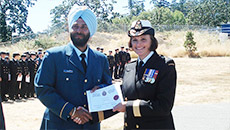Over the years, the BC Teachers’ Federation (BCTF) and provincial government have had a tumultuous relationship and as a result, their disagreements have often made front page news. In the latest round, teachers have moved forward with an escalation in job action to stage 2. We had a chance to sit down with BCTF President Jim Iker, who advocates on behalf of BC’s 41,000 teachers and their students for improved educational conditions, to learn what he had to say about his new role, ongoing negotiations and what needs to be done.
Can you tell us about yourself?
I grew up in the towns of Welland and Oakville in Ontario. I received an honour’s degree in Political Science and Sociology at McMaster University, and then I completed my Bachelor of Education at Dalhousie University in Halifax. I moved across the country in 1977 to Topley, BC, where I taught Grade 2. I was also involved in Burns Lake District Teachers’ Union. My teaching career has spanned over 36 years, in which I filled a number of roles including primary school teacher, teacher counsellor and learning assistance and special education teacher. In 2002, I was first elected to the BCTF Executive Committee and served in this position for five years. And for six years, I was 1st, then 2nd vice-president of the BCTF. I was elected president in 2013 and represent the province’s 41,000 public school teachers.
What is your role and responsibilities as BCTF President?
It’s an honour and privilege to be elected as BCTF president and represent our members across this province and advocate on their behalf and advocate on behalf of the learning conditions of our students, as well as for public education. What I bring to my role is that fact that I am a classroom teacher and learning specialist – you never forget that and it guides me in the work that I do. We are a very democratic organization, my responsibilities involve following the guidelines and policies…that’s where my guidance comes from. I’m also the spokesperson for the BCTF.
You bring a new style of leadership to the BCTF, how would you describe your style in contrast to past predecessors?
Every one of our past presidents have done an amazing job as president, I’ve always believed that we have had the right person in the role of president for every phase that we’ve done over the years. In terms of what I bring to the role, I bring a very positive, optimistic, calm attitude with me. I am very patient, I like to listen before I respond.
In ongoing talks with the BC government, why does the BCTF continue to advocate for class size and composition and proper staffing levels?
We believe that as classroom teachers the actual size of the class does matter in our ability to give students individual attention, which all students deserve. When we deal with issue of class composition…when you have students with different needs, then you need to have available supports in place for them to meet their needs. Sometimes the supports are specialist teachers, such as learning assistance and specialist education resource teachers and teacher counsellor/librarian – it’s important that students who need additional help, whether it’s specialized or general, have access to those specialist teachers…As teachers, we want to be able to support every student in the best way that we can. And the reason why we believe our system is still so strong is because of the work that our teachers continue to do despite the conditions that we and our students have faced with the underfunding and the cuts.
Why were teachers happy to hear the demand for a 10-year contract was off the table? Why was a 6-year contract a better option?
We never thought the 10 year was a workable option, actually that was a proposal put in to the media for a number of months by Premier [Christy Clark] for her own political gain. It was never brought to the bargaining table, in fact when we opened up bargaining in February 2013, the employer put a two-year term on the table even knowing out there that the Premier was saying 10 years. Even when they finally tabled 10-year term, the last four years was very nebulous – whole purpose for them was to prevent us from having the right to strike. We’ve moved to 4-year term, they’ve moved down to 6-year term – it’s a bit more realistic and we’re open to compromise. In 2006, we settled a 5-year term but the government had that time was willing to bring the necessary funding to make a deal happen.
Why did the BCTF recently announce an escalation in job action – moving to stage 2, which includes rotation strikes?
We have been very patient in this round of bargaining, been at the table more than 16 months now trying to get an agreement. Government fired their own chief negotiator and changed some of their board of directors on BCPSEA. And we had to be patient about that, we had to re-go through all our proposals in the fall to explain it to the new negotiator Peter Cameron. We’ve been patient, and in a democracy, we have to exercise rights and one of our rights is to take a strike vote. We were hoping by taking a strike vote, 89 per cent in favour of action, it approved two-stage action – low level stage one and stage two – was all going to be based on whether there would be progress at the bargaining table.
We were hoping our strike vote would be enough and we found that the government didn’t change its attitude, didn’t bring necessary funding to the table to get a deal, didn’t seem serious about wanting a deal with us, so we reluctantly moved to stage, which is low level action we were on, staying in our classroom teaching. And again based on progress at bargaining table, the government has not moved off their position on class size.
We win the Supreme Court decision, says restore the provisions that were legally stripped out, we know it’s the government’s right to appeal, but what we were hoping is that they would give the school district’s necessary funding to restore the provisions come this September…we were hoping they would do the right thing, rather than go into more litigation. Two weeks after that decision, they tabled language that in effect strips the collective agreement of all those provisions again and they want to keep the status quo meaning further cuts, higher class sizes and less specialist teachers.
What do you think about the cuts to the Coquitlam School District?
It is very unfortunate, we have been advocating that it’s time for this government to bring in stable funding to school districts. According to Stats Canada, this government underfunds to the tune of $100,000 less per student than the Canadian average. We have the second worst funding next to Prince Edward Island according to Stats Canada, and this is British Columbia right? And every other province, despite good or bad times economically, have always found more money to put into schools except this government.
Why is it important to develop a funding plan to bring education funding in line with other provinces in Canada, so BC is not one of the worst in the country?
It would be good for school districts to know to have a stable plan, can plan ahead and know that they’re going to get sufficient funding to cover cost of inflation and to cover downloadable costs created by government. Like when govt increases MSP premiums, Hydro and ICBC rates, the government should give school districts the money. And also make sure that school districts are funded for collective agreements. This government has not been negotiating collective agreements...What we proposed in our brief to the Standing Committee on Finance that they at least come up to the Canadian average or better within the next three years. It should be better than that, but we are trying to be patient. Their own Standing Committee on Finance, for the first time ever, stated that there needs to be more money to K-12, that at least they need to fund cost of living and inflation and downloadable costs. And that they also need to put more money towards students with special needs. They ignored that. I think its important because what we have is steady cuts, and we get worse, Stats Canada shows that. I think it’s time that public education become a priority for this government.
Why has the BCTF and provincial government had a tumultuous relationship over the last 5 to 10 years?
One of the commitments I tried to make when I became president is to try and develop a relationship with this government. We know they were re-elected for four years and we have to work with them. I’ve asked for meetings with Premier Clark, I introduced myself to her on the day of the Throne Speech and said ‘I think it’s time that we meet’ and she agreed. Well, that was February and we’re now in May. So we did send a letter to her asking to meet. And surprisingly for the first time ever, she said ‘What do you want the meeting to be about?’ Sent back an email stating, it’s about building a relationship, and we have not heard back. And I’ve asked to send another email asking ‘What’s the problem?’ It would be good to have an initial meeting with the Premier, just to talk about ‘What is the issue here? We have to be able to get along.’ We were meeting with Minister Fassbender once a month until February, hasn’t met with us since then though he talks about relationship building. But part of relationship building is also that they have to make commitments, and it’s not just about talk, it’s about commitment, action and funding. We are a social justice union of professional, we are a trade union, proud to be unionized teachers but we take to heart our role of advocating for students in public education.
What needs to be done to satisfy the BCTF’s requirements for a long-term contract agreement with the government?
It needs to address class size, class composition guarantees and minimal levels of specialist teachers into the collective agreement. A respectable wage increase that deals with not just cost of living, but helping close the gap between our salaries and salaries of other teachers across this country, that will show respect. The importance of preparation time for teachers, it’s an issue that we haven’t been able to address in 20 years, we’re far behind teachers in other provinces, namely Ontario, Saskatchewan and Manitoba – that’s part of what we see as our working conditions, which help our student’s learning conditions. And we need to address some of the issues of our early career teachers.




